



































OnahNwachukwu Editor, THEWILL DOWNTOWN
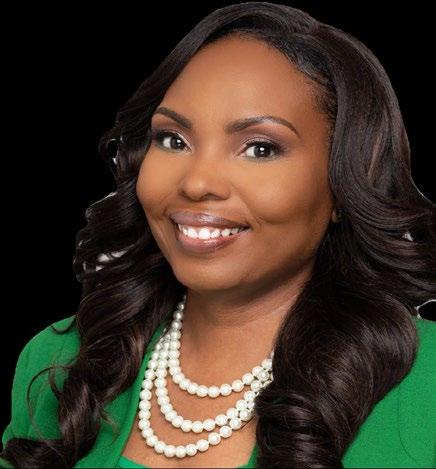





Chantel Ross Francois is one of the few names that combine international expertise, local impact, and visionary leadership in the world of tourism. Interestingly, what shaped her love for tourism and cultural exchange is her household. Francois grew up in a Canadian Caribbean American household, which gave her a unique lens on the world. She was surrounded by different cultures, traditions, and values from an early age, and it taught her that hospitality is more than just service; it’s a connection. For her, every family gathering was like a mini cultural exchange, and that naturally expanded into a love for showcasing destinations, cultures, and experiences. Tourism has always been a passion and a bridge for Francois—it’s about bringing people together and creating spaces where the world feels a little smaller and more familiar. Her job entails reimagining how cities welcome people, and she does so effortlessly.
Read Chantel Ross Francois’s story on pages 8 to 10.
Shoes carry us through long walks and busy workdays; however, they can also become a source of pain when they are too tight, too hard, or not designed for comfort. Pages 4 and 5 outline suggestions to make your shoes more comfortable.
Our beauty page discusses makeup essentials. Beauty writer, Dorcas Akintoye, reminds us that less is more when it comes to makeup, and that we don’t have to carry our entire vanity case with us everywhere we go; just a few key items are needed—think of them as your “emergency kit” for quick touch-ups throughout the day. Scroll to page 12 for this.
We celebrate Nigeria’s 65 years of Independence with a special feature on pages 13 and 14. I urge you to read it.
Happy 65th Independence to Nigeria.
Until next week, enjoy your read.










SUNDAY, OCTOBER 05, 2025






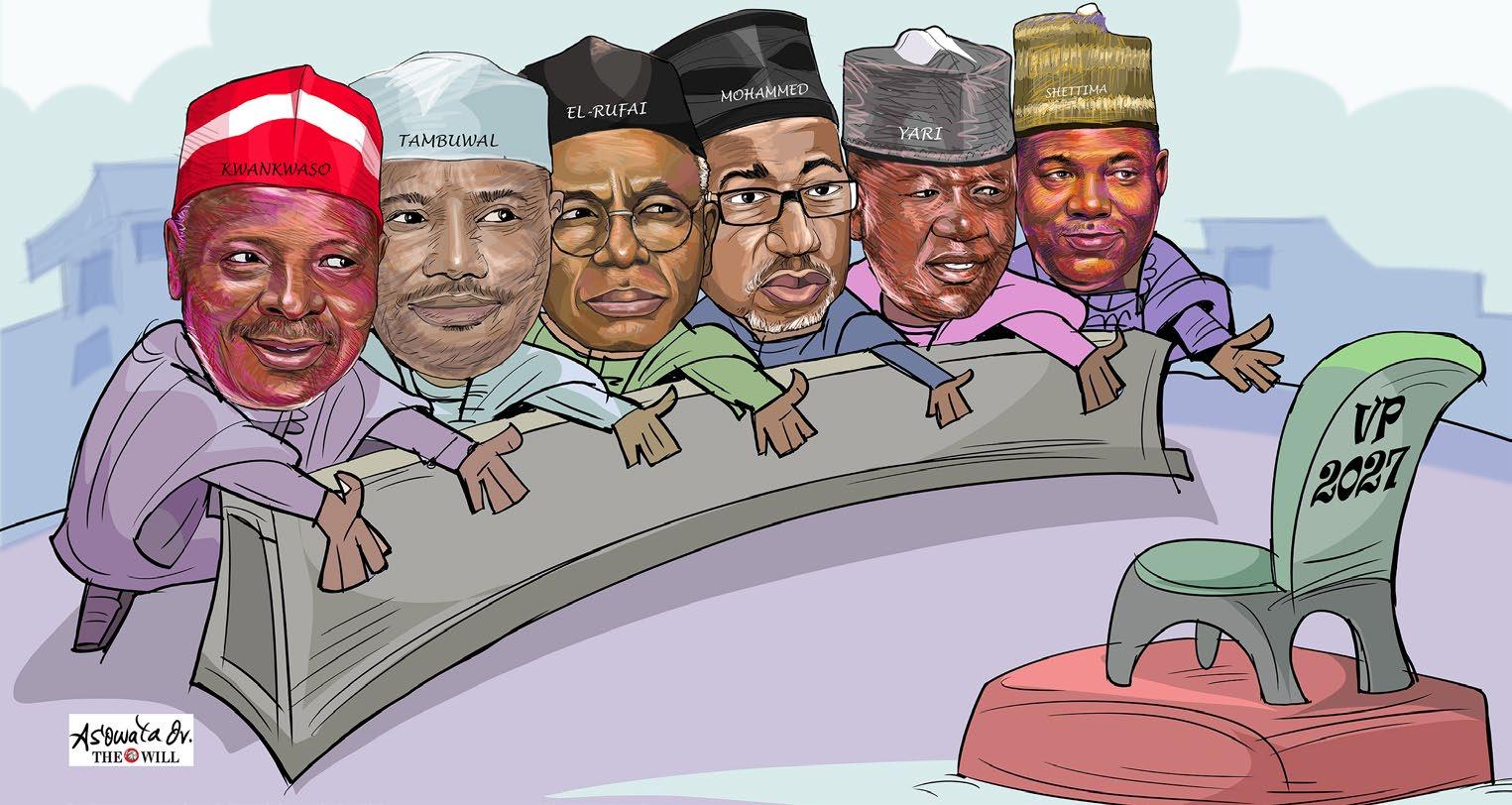
BY AMOS ESELE
Avice presidential candidate is usually the making of a presidential candidate of a political party or the choice of a party caucus after a presidential primary has been held.
Vice presidential candidates are usually known for the art of subtle manoeuvring and cunning, as can be observed now in the polity ahead of the 2027 general poll. THEWILL gathered that some big wigs in major political parties in the country are already scheming for the VP ticket, first as a position and second as a launch pad for their presidential ambition in the 2031 elections.
According to checks, at least five of such politicians are jostling for the ticket in a way that is also shaping the 2027 presidential race in the ruling All Progressives Congress, APC, the Peoples Democratic Party, PDP, and the African Democratic Congress, ADC. Sources say the general political understanding among politicians to zone the presidential ticket to the South is fueling the struggle as all the aspirants are from the North.
and VP Kashim Shettima are all in play, according to THEWILL checks.
BALA MOHAMMED:
For someone who first unveiled his presidential ambition in 2022 when he contested the PDP’s presidential ticket in the 2023 general election, the recent zoning of the PDP’s presidential ticket to the South seems to have put paid to his ambition. After losing the ticket to former Vice President Atiku Abubakar in the party’s presidential primary in June 2022, Mohammed scrambled back to Bauchi and initiated a rerun governorship primary in which he was the sole candidate, contested and won the election for a second term in office.
Goodluck Jonathan who has been wooed by some party leaders to rethink contesting the presidency again or Makinde. Both Jonathan and Makinde have the qualities that Mohammed says would strongly work in favour of the party in 2027: A Christian who would pair with a Muslim from the North in 2027.
In a recent interview with a national television, Mohammed admitted his willingness to accept the position of VP if the party nominates him for the position.
He said, “Of course, if it is within the sense of judgment of our party leaders and the presidential candidate to choose me, I’m ready, but certainly if I’m not given, I have said it to the public today, I’m ready to give whoever the party or the presidential candidate that will emerge from the South a chance to bring somebody else if he is better than me.”

Bala Mohammed of Bauchi State, who also chairs the PDP Governors Forum; former Governor of Sokoto State and current Senator, Aminu Tambuwal, ex-Kaduna Governor, Nasir El-Rufai; leader of a faction of the New Nigeria Peoples Party, NNPP, Rabiu Kwankwaso, who was the party’s presidential candidate in the 2023 election, former Zamfara State Governor and current Senator, Abdul’aziz Abubakar Yari
Party sources say before the zoning of the party’s presidential ticket to the South, Mohammed was nursing the ambition to run again for the presidency. This time around though, he is open to running as VP alongside Seyi Makinde, the Oyo State Governor, who has openly declared his presidential ambition. Makinde re-echoed his ambition during a courtesy visit to the then Olubadan of Ibadan in waiting, Chief Rashidi Lagoja, who was eventually crowned on September 26, 2025, as HRM Arusa I. During the governor's visit, Ladoja had asked the palace chiefs to support the governor’s ambition.
The point is whoever emerges presidential candidate of the party has Mohammed as a VP candidate in waiting, whether it is ex-President

Arguing that the party needs to be very sensitive to the religious divide in the country, he expressed the need for the party to have “a Christian from the South to emerge as a presidential candidate, so that he will lead the majority of Christian southerners to come and pick the majority Muslim vice president in the North.”
Sources within the PDP disclosed to this newspaper that even Mohammed knows that among the five governors on the party’s platform from the North, he is eminently qualified for the VP post. Apart from Governor Ahmadu Usman

Fintiri of Adamawa State, who is also doing a second term in office, other governors on the party’s platform from the North are Agbu Kefas of Taraba, Caleb Mutfwang of Plateau and Dauda Lawal of Zamfara. They are all first term governors and are likely to dump the PDP for the APC, as earlier reported by THEWILL because of the endless infighting at the party’s leadership.
Fintiri is currently the Chairman of the party’s National Convention Organising Committee, scheduled to hold in Ibadan, the Oyo State capital in November. He is not known to have shown interest in the presidency.
As part of his strategic move, Mohammed has been in the forefront of engaging with potential aspirants being considered by the party as a presidential candidate, from ex-President Jonathan to Labour Leader, Peter Obi and former Minister of Transportation, now ADC chieftain, Rotimi Amaechi, both of whom he said he is still wooing to come back to the party. Following the party’s zoning formula, the presidential ticket will return to the North in 2031, placing Mohammed in a prime position to emerge the party’s flagbearer.
RABIU KWANKWASO:
The former governor of Kano State, who recently disclosed that he is open to working with the APC, though on his own terms, is said to be eyeing the ruling party’s VP position as long speculated by the media. Saddled with a factionalised party, the New Nigeria Peoples Party, NNPP, on whose platform he contested the 2023 election, hit by defections by elected National Assembly members and cautious of the schemes of the rival APC in the state, as evident in the results of the recent by-election in which both parties won a constituency each, Dr. Rabiu Kwankwaso is said to contending with a bigger political gamble that may make or mar his political stature in the North if he remains complacent.
The death of ex-President Muhammadu Buhari has created a political vacuum in the North that is waiting for any formidable politician to fill. For now, former Vice-President Atiku Abubakar and Kwankwaso fit the bill. Sources say the emergence of ADC has given Abubakar a popularity that Kwankwaso fears would dwarf his image and relevance, even in Kano politics. In fact, a Kano-based party source confided in this newspaper that if Kwankwaso had not run as a presidential candidate in the 2023 poll, Abubakar would have swept the Kano votes as he did in four of the seven Northwest states, namely Kaduna, Katsina, Kebbi and Sokoto.
“In the attempt to fill the political gap left by former President Buhari’s death, politicians of Kwankwaso’s standing would want to share the limelight with any equally formidable politician and frustrate attempts to relegate him to secondary roles,” said a party source, adding, “Now that he said he is ready to work with APC, how he goes about it I cannot tell. But at least he has laid his cards on the table. 2027 is a long time away.”
President Bola Tinubu reshaped public thoughts about recent speculations on Vice President Kashim Shettima’s fate ahead of the 2027 general poll, while eulogising him during his 59th birthday on September 2, 2025. “I deeply appreciate your vibrancy, loyalty, partnership and support as my deputy. In choosing you then as a partner, I selected competence and other qualities that Nigeria could depend on,” Tinubu said in a glowing birthday statement.
But as the presidential spokesperson once remarked in a newspaper interview when asked about the speculation, the President will choose his deputy after the party’s presidential primary in 2026. For a president who has already been endorsed by all the organs of his party and stakeholders, that decision is still his responsibility to make.
Nonetheless, VP Shettima is said to have been unfazed by the prospect of losing his position, while the talk about his political future lasted. Some of President Tinubu's men who were said to be behind the move showed their hands too early and therefore achieved counterproductive results. For now, everything appears calm, but like a source told THEWILL, 2027 is more than a long time in politics, giving both parties, especially the VP, enough time to deal their cards well and achieve the ambition of succeeding the President in 2031, if the party wins the 2027 poll.
As a former Speaker of the House of Representatives, two-term Governor of Sokoto State and an influential figure in the coalition that grew into ADC, Senator Aminu Tambuwal, representing Sokoto South Senatorial District in the National Assembly has whetted his appetite for the presidency twice and lost on both occasions.
In 2018, he contested at the PDP’s presidential primary held in Port Harcourt, the Rivers State capital and lost to Atiku Abubakar, who emerged the party’s candidate that year. He repeated the feat in 2022, but stepped down at the convention
“ THEWILL gathered that some big wigs in major political parties in the country are already scheming for the VP ticket, first as a position and second as a launch pad for their presidential ambition in the 2031 elections
grounds to Abubakar, who, again, emerged the party’s candidate. In the 2018 primary, Tambuwal put up a good showing, having emerged second position with 693 delegate votes behind Abubakar who won with 1,532 votes. After the 2022 step down for Abubakar, Tambuwal remained an Abubakar loyalist.
Although Abubakar has clarified his statement in a recent Hausa Service BBC interview that he would run for the ADC presidential ticket, contrary to reports that he will step down for a younger person, Tambuwal is said to be waiting in the wings as a most likely VP candidate if a Southern candidate were to emerge victorious in the party’s presidential primary. The party has stated that, like other rival parties that have zoned their presidential slots, it would throw all positions open for contest. Senator Tambuwal is the Abubakar’s camp candidate for the VP position, should the latter fail to pick the plump position of the party for the 2027 polls, according to THEWILL checks.
NASIR EL-RUFAI:
In the same vein, the former Kaduna governor, who is the only one in the pack of VP hopefuls yet to openly aspire for or contest for the presidency, is also said to be eyeing the VP post, should a candidate from the South pick the ADC presidential ticket. Rotimi Amaechi and Peter Obi are said to be his preferred bets.
Although El-Rufai's son, Bashir excited social media with his recent post that an Obi with “a cult-like followership” who “appeals across the youths and younger generation,” would win the 2027 election “if he fielded,” an unnamed but implied, “strong northern candidate,” sources say that Obi and El-Rufai have taken to each other like conjoined twins since the unveiling of the ADC. Remarkably, both are yet to resign from their political parties and join the ADC.
For all his perceived faults, the former Kaduna governor is said to be close to members of the aggrieved wing of Buhari’s Congress for Progressives Change, CPC, within the APC. His contention for a strong space within the vacuum created by the death of the former president places him in serious contention for the VP slot whether within the ADC or out of it.
The former Governor of Zamfara State, who represents Zamfara West in the Senate on the platform of the APC, wields a lot of influence among his colleagues at the National Assembly, according to THEWILL checks. The politician is stupendously wealthy. He doles out cash and gifts frequently to his colleagues in the National Assembly and politicians in the North-West as part of his outreach to shore up his political base. Yari’s wealth is allegedly linked to his business interest in mining in the north as well as tax consultancy services for the Federal Government.




BY SAMPSON UHUEGBU
The First Lady, Senator Oluremi Tinubu, has flagged off the Renewed Hope Initiative (RHI)/Tony Elumelu Foundation Women’s Economic Empowerment Programme in Imo State, which aims to strengthen small-scale businesses owned by women.
Speaking at the event, where she was ably represented by the First Lady of Imo State, Barrister Chioma Uzodimma, Senator Tinubu described the programme as a lifeline to support women traders and entrepreneurs, who work tirelessly to provide for their families, educate their children, and uplift their communities.
She emphasised that the initiative was not a loan but a grant,

BY FELIX IFIJEH

describing it as a “seed of renewed hope” to help women recapitalise and expand their businesses.
Under the programme, funded through a N1 billion donation by the Tony Elumelu Foundation, a total of 18,500 women across the nation will each receive a grant of N50,000. Beneficiaries include 500 women selected from each of the 36 states and the FCT.
In Imo State, the First Lady presented the grant to some of the 500 pre-selected beneficiaries. Senator Tinubu, in her remarks, expressed deep gratitude to the Tony Elumelu Foundation for what she described as a “remarkable act of generosity”, urging others to emulate the gesture by supporting women-led businesses across the
country. She also commended the Governor of Imo State, Senator Hope Uzodimma, and his wife, Barrister Chioma Uzodimma, for their unwavering support in executing the programmes of the Renewed Hope Initiative in the state. Adding to the gesture, Governor Uzodimma announced an additional N50,000 support for each of the 500 beneficiaries, bringing the total amount each woman received to N100,000.
The event ended with Senator Tinubu formally flagging off the programme for the benefit of women in Imo State, “When you empower a woman, you empower a household, a community, and indeed, a nation.”
Former President, Goodluck Jonathan, has said the Boko Haram insurgency is “far more complex” than often portrayed, noting that even his successor, the late President Muhammadu Buhari, could not defeat the group despite being once nominated by the insurgents as their preferred negotiator. Jonathan made the disclosure on Friday in Abuja, during the public presentation of Scars, a book written by former Chief of Defence Staff, Gen. Lucky Irabor (retd.).
The former President said his administration had set up several committees to explore dialogue with the insurgents, and in one instance, the group picked Buhari as their preferred negotiator.
“One of the committees we set up then, the Boko Haram nominated Buhari to lead their team to negotiate with the government. So I was feeling that, oh, if they nominated Buhari to represent them and have a discussion with the
government committee, then when Buhari took over, it could have been an easy way to negotiate with them, and they would have handed over their guns. But it was still there till today”, Jonathan said. Jonathan noted that Buhari’s eventual struggle to defeat Boko Haram during his tenure showed that the insurgency was “far more complex” than often portrayed. According to him, Boko Haram’s roots and operations cannot be captured by a single narrative, stressing the need for a broader and unconventional approach.
"If you conduct research and interview many people, you will only get part of the story, but never the full story of Boko Haram. I was there. Boko Haram started in 2009 when I was vice president. I took over in 2010 and spent five years battling the insurgency until I left office. I thought that after I left, within a reasonable time, General Buhari would wipe them out. But even today, Boko Haram is still there. The issue of
Boko Haram is far more complex than it is often presented.
“So, it’s a bit complex, and not a matter of a single story. But I believe, as a nation, we have to look at the Boko Haram issue differently from the conventional approach. I believe one day we’ll overcome it”, he said.
Jonathan also commended Irabor for documenting his experiences in Scars, urging other military officers who participated in counterinsurgency operations to provide their own accounts to enrich the historical record.
“Once again, let me thank General Irabor for this, because I always appreciate people who document events clearly. That way, when we write our own accounts, we can borrow from such documentation. I also believe that all the military officers involved in the Boko Haram saga should provide information about what the group truly stood for”, he charged.
The Defence Headquarters (DHQ) said the troops of Operation Delta Safe have destroyed 41 illegal refining sites and foiled oil theft worth over N112.1 million in the Niger Delta in September. The Director, Defence Media Operations, Maj.-Gen. Markus Kangye, disclosed this in a statement on Saturday in Abuja.
Kangye said the troops had maintained aggressive patrols and air reconnaissance to curb crude oil theft, pipeline vandalism, and other forms of economic sabotage.
According to him, the troops had also recovered 49,321 litres of crude oil, 6,970 litres of Automotive Gas Oil (AGO), 1,900 litres
of Dual Purpose Kerosene (DPK) and 1,475 litres of Premium Motor Spirit (PMS) from criminals during the period under review. “Troops also destroyed 41 illegal refining sites, 21 cooking ovens, 9 dugout pits, 11 storage tanks, seven boats and arrested several suspects involved in the illegal trade,” he said.
Kangye added that troops dismantled multiple oil theft networks and seized equipment used for large-scale bunkering, including pumping machines, hoses, and generators. He said the operations were carried out in Delta, Bayelsa, and Rivers States, with support from other security agencies.
The defence spokesman reaffirmed the military’s resolve

to sustain its onslaught against crude oil theft, adding that the fight against economic saboteurs remains a national priority due to its direct impact on Nigeria’s economy and environmental safety.
He urged the host communities to support the security forces with timely information to help identify and disrupt oil theft networks operating in their areas.
“Our operations will continue to target the sources, storage facilities, and transportation channels used by oil thieves until these criminal enterprises are completely dismantled,” he said. (NAN)
Governor Sheriff Oborevwori of Delta State at the funeral of Nana Lydia Yilwatda Goshwe, mother of the APC National Chairman in Jos, Plateau State on Saturday October 4, 2025.

BY FELIX IFIJEH
Thousands of market women in Benin City, on Friday, staged protests across major markets to denounce the purported installation of Pastor Josephine “Otagbogbo” Ibhaguezejele as “Iyaloja” of Benin markets.
The women, who converged at Oka, Ekiosa, Ogiso, Uselu and New Benin markets, described the title as alien to Benin tradition and vowed to resist any attempt to introduce it into their market system.
Carrying placards and chanting solidarity songs, the traders
praised the Oba of Benin, Omo N’Oba N’Edo Uku Akpolokpolo, Ewuare II, for what they called his timely rejection of the “Iyaloja” designation, stressing that the monarch had once again defended the cultural values of the Benin people. “We will never accept strangers imposing titles that do not belong to our tradition. Our loyalty remains with the Oba of Benin, and we stand by his decision”, one of the leaders said.
The demonstrators also warned fellow traders against paying levies or dues to Pastor Josephine or her representatives,
describing her as unwelcome in Benin markets. They urged members to report any form of harassment or intimidation connected with the disputed title.
Friday’s protest is the first in a series of demonstrations planned by different groups in Edo South, as community leaders insist that the attempt to install an “Iyaloja” in Benin represents a threat to the centuries-old cultural heritage of the people.
The rally ended with traditional chants of allegiance to the Oba: “Oba gha to kpere, Ise.”
BY AMOS OKIOMA
Authorities of the National Youth Service Corps have said the Skill Acquisition and Entrepreneurship Development, SAED, programme for Corps members during service year is an interventionist strategy to address graduate youth unemployment and enable Corps members to serve as opinion leaders in matters of skills acquisition and wealth creation.
According to the Director of NYSC South- South Area Office 1. Mr. Olusegun who described the programme as a strategy of activating the creative ability in graduate youths on national assignment during his official visit to the NYSC Permanent Orientation Camp, Bayelsa state, the world is tilting towards 'Sabificate' and not just certificate, "and so you must be intentional in selecting a skill to learn.
The In - camp training is free of charge while the Post
Camp training is highly subsidized for your benefit."
Olusegun, who also took the Corps members through the cardinal programmes of the Service Corps, urged them to actively participate in all the activities as they are strategically designed to bring out virtues befitting good citizens and leaders.
Dwelling exhaustively on the SAED programme, the Director urged them to take full advantage of the In- camp and Post - camp training programmes to join the league of Corps Entrepreneurs.
He urged them to be security conscious and cautioned them against use of fake medical certificates for purposes of relocation application as this act will negatively affect them in the future.
Most importantly, he cautioned against unnecessary journeys, travelling without official permission and across rivers without properly wearing a life jacket.
Mr. Alao wished them a fruitful service year and committed them to the blessings and protection of the Almighty God.

Earlier, the State Coordinator, Mrs Okpalifo Obiageli Charity welcomed the Director to the camp, briefed him about the camp’s activities, progress, challenges prospects and assured him about strict compliance with orientation course policies.
She commended the camp officials for the dedication to assigned duties members for their high level of morale, attendance during all camp activities.
BY FELIX IFIJEH
Rivers State Governor, Siminalayi Fubara, on Friday, issued a stern warning to permanent secretaries who allegedly aided illegality during the recent emergency rule in the state, stressing that there will be no hiding place for compromised officials. The governor gave the warning at the Government House, Port Harcourt, during the swearing-in of a new permanent secretary, Austin Ezekiel-Hart. The oath of office was administered by the Chief Registrar of the State High Court, David Ihua-Maduenyi.
Charging the new appointee to uphold professionalism and the values of the service, the governor emphasised that integrity and due process remain non-negotiable in his administration. In a stern message to some permanent secretaries, he accused them of compromising their duties during the state’s emergency rule, Fubara declared: “For every one of you here, Permanent Secretaries who were involved in illegality—when I say illegality, I’m not talking about the administration of the emergency rule itself; it
was a situation beyond control. But those who supported actions that fell short of civil service standards, be sure your punishment will come. The records are there, and at the right time, I will bring them up, one after the other, against you.”
He commended Ezekiel-Hart for standing firm under pressure, describing him as a professional deserving of recognition, and reaffirmed his administration’s commitment to rewarding uprightness while sanctioning misconduct.


BY ABDULLAHI YUSUF
The National Hajj Commission of Nigeria(NAHCON) has announced December 31, 2025, as the final deadline for the completion of payment of fares for the 2026 Hajj. The Chairman of the commission, Prof. Abdullahi Usman, disclosed the deadline while addressing a press conference in Kano on Friday, shortly returning from a working visit to Saudi Arabia.
"The deadlines now stand as pillars of our preparations, meaning that by 8th October 2025, States are to remit 50% fare deposits to the Commission in order to maintain their allocations.
"Accordingly, by 31st December 2025, every pilgrim must have completed payment for their 2026 Hajj fares. These deadlines are not just administrative, but to guarantee early camp booking, stronger contracts, and provision of efficient services", he added.
He said he departed Nigeria for Saudi Arabia on the 22nd of September 2025, and had carried with him "one mission, that is to defend the Nigerian pilgrims, to secure for them cost-efficient services and to prepare the
ground for a better 2026 Hajj." "Our task was negotiation, planning and securing the best services for Nigerian intending pilgrims. Today, I stand before you not with promises, but results.
"We achieved meaningful relief for pilgrims. Through determined engagements with State Pilgrims' Welfare Boards Executives and our Saudi partners, NAHCON has secured more than N200,000 service cost reduction per pilgrim. With 66910 slots allocated to Nigeria, this equals more than 19 billion cost relief secured", the chairman said. He said the feat aligned with President Bola Tinubu's Renewed Hope Agenda that Nigerian Pilgrims are getting these great reliefs.
Prof.Usman said the commission had strengthened the 2026 Hajj foundation by achieving the signing of Masha'ir Services contracts with Mashariq Dhahabiyya company, as well as Transport services with Daleel Al-Ma'aleem company.
"We also concluded contracts for Madinah accommodation and feeding, ensuring that quality accommodation is secured in Markaziyya at the best rates possible. And also
interacted with the Saudi Ministry of Hajj and Umrah with honest assessment and firm recommendations from the lessons of 2025 Hajj", he said.
He also disclosed that the commission had inaugurated the 2026 Hajj Tour Operators Screening Committee to screen and ensure that only those who meet the requirements would serve Nigerian pilgrims, adding that "the days of shortcuts and cutting corners are over."
The chairman stated that the commission had initiated intensive training for its staff to prepare them for future Hajj operations. "You are aware that 2026 Hajj fares were announced early enough this year, which reflects fairness, and not excess with a view to allowing intending pilgrims to pay on time, with Maiduguri/Yola - N8,118,333.67, Northern states - 8,244,813.67 and Southern statesN8,561,013.67", he said.
He noted that the success of Hajj 2026 "cannot be improvised, it must be built early, with discipline, confidence, foresight and courage. That is why we engaged, negotiated, and acted ahead of time."
Cleen Foundation, a Non-Governmental Organisation (NGO) says voter’s turnout is vital to ensuring free, fair and credible polls in the forthcoming Nov. 8 Anambra governorship poll.
Mr Peter Maduoma, Acting Executive Director of the foundation, said this on Friday in Abuja at the media dissemination of the 2025 Anambra Governorship Election Security Threat Assessment (ESTA).
The Independent National Electoral Commission (INEC) fixed the 2025 Anambra Governorship election on Nov. 8. Maduoma said that there was a need to address certain indicators identified as threats that might mar the electoral process.
ahead of the election. “The primary objective of the media dissemination is to ensure that the security threat assessment is accessible, understandable and actionable for stakeholders, especially government officials, law enforcement agencies, civil society organisations and the general public.
“Our aim is to enhance public awareness, encourage proactive security measures and promote peaceful electoral processes,” he said.
Maduoma said that copies of the assessment had been distributed to stakeholders including the police for further actions.
foundation said that though Anambra is not prone to election violence.
Hashim however said that past election incidents called for precautionary actions to be taken before, during and after the election.
According to him, “the attacks on police stations, INEC officials and government infrastructure in areas such as Aguata, ldemili- North and Anambra-East Local Government Areas highlight the scale of threats,” he said.
He also highlighted the roles of the youths, INEC, the police, community security groups, traditional rulers and the electorate amongst other stakeholders.

According to him, voter’s apathy amongst others may contribute largely to the outcome of the entire election which must be tackled by stakeholders.
“Our comprehensive election security threat assessment has highlighted potential flashpoints, actors of concern and triggers of violence and mitigation recommendations

He, however, noted that the role of the media was crucial and invaluable in ensuring accurate, timely and responsible reports.
Maduoma urged journalists to contribute their quotas to ensure peaceful, credible and inclusive elections.
Mr Salaudeen Hashim, Director of Programme of the
Hashim said that everyone had a role to play to ensure the success or failure of the elections.
He urged the government not to militarise the election, shun the use of intimidation also for the youths to shun violence and respect electoral laws and processes.(NAN)
BY FELIX IFIJEH
Nigerians from all works of life are still divided over the strides made by the country in its 60 years of life. For the Federal Government, which christened the 65th Independence Anniversary celebration, "All Hands on Deck for Greater Nigeria," the country was developing at a pace set by its founding fathers since independence and it is time for every Nigeria to join the bandwagon.
During a nationwide broadcast to mark Nigeria's 65th Independence anniversary on October 1, 2025, President Bola Tinubu declared that Nigeria had turned the corner economically. “The worst is over,” he said, as he reeled out key achievements of his administration.
Tinubu said his government’s painful but necessary reforms, including fuel subsidy removal and foreign exchange unification, were dismantling decades of distortions and freeing up resources for development. “We now have more money to build the Nigeria we deserve,” the President stated, insisting that the sacrifices of Nigerians were beginning to yield tangible results.
He cited recent economic data showing that Nigeria’s GDP grew by 4.23 percent in the second quarter of 2025, the fastest in four years. Inflation, he said, fell to 20.12 percent in August, the lowest in three years, while external reserves rose to $42.03 billion, the highest since 2019. He added that Nigeria had now recorded five straight quarters of trade surpluses, while crude oil production had recovered to 1.68 million barrels per day.
Tinubu further revealed that non-oil revenues had surpassed N20 trillion this year, reducing the debt-serviceto-revenue ratio from nearly 97 percent to below 50 percent. On social investment, he announced that N330 billion had been disbursed as direct cash transfers to more than eight million vulnerable households. He also highlighted the National Student Loan Fund (NELFUND), which has so far disbursed N99.5 billion to 510,000 students in 228 institutions, alongside youth-focused initiatives such as Credicorp, YouthCred, and iDICE.
The 36 state governors in unison called for unity and rededication of Nigerians to the ideals of nationhood where loyalty, patriotism, selflessness and justice thrive. The opposition caucus in the House of Representatives however said there is more work to be done on almost all fronts and urged the nation to confront the uncomfortable truth that its political and economic structures require deliberate and timely reforms.
In a congratulatory message jointly signed by caucus leaders — Rep. Kingsley Chinda, Minority Leader; Rt. Hon. (Dr) Ali Isa J.C, Minority Whip; Rt. Hon. Aliyu Madaki, Deputy Minority Leader; and Rt. Hon. George Ozodinobi, Deputy Minority Whip, the caucus said: “As we celebrate another year of freedom from colonial rule, we salute the sacrifices of our founding fathers and heroes past who gave everything for the independence we enjoy today.
Today presents another opportunity for sincere reflection and objective introspection — for us as a people to look back on our journey of nationhood, the road taken and not taken. In doing this, we must be honest in our assessments.We must be fair, frank and firm. Only when we are true and factual about the state of our nation can Nigeria break free from stunted development and realise her full potential as a prosperous country."

us are increasingly strained, resulting in divisions that threaten cohesion and progress.
Dr. Olu Fasan, an economist and politcal analyst described the occasion as one for sober reflection. For him, the sad truth is that, "beyond the fact of its existence as a political entity, there’s little worthy of jubilation about Nigeria at 65. If that statement sounds outlandish, then consider the following three critical measures of a nation’s success: unity, security and prosperity. Add a fourth: state capacity. How well has Nigeria fared, at 65, on these indices of development? Abysmally, one must say! The answer is no."
Arguing that the capacity of the Nigerian state to deliver public services amid corruption has reduced over the years, he stated that as a country with one of the lowest per capita incomes in the world, which was once listed as the “poverty capital of the world”, with most of its citizens living below the poverty line, Nigeria is a deeply unequal country; the gap between the rich and the poor is so wide that the middle class has virtually vanished. Yet, the expansion of the middle classes is a test of a healthy nation.
as an extractive state, where the distribution of power is narrow and unconstrained, where those with political power use their offices to amass wealth and use the wealth to sustain their power, and where there is absolutely no incentive for those in power to provide the basic public services that would improve the quality of life for ordinary people and to engender economic progress and prosperity for many, not a few. That’s the political, economic and social cul-de-sac that Nigeria is trapped in today, 65 years after independence."
Former Minister of State for Defence, Senator Musiliu Obanikoro reflected on the country's journey through the years and insisted that Nigerians had consistently risen above adversity and pointed to the stability of democratic governance and the global achievements of Nigerians as proof of the country’s enduring greatness.
He said, “Sixty-five years ago, our founding fathers, with uncommon courage and conviction, reclaimed our sovereignty and entrusted us with the sacred responsibility of nationhood.
“Since then, Nigeria has faced trials that would have broken lesser nations. Yet, time and again, Nigerians have demonstrated an unyielding capacity to rise above adversity, to endure, and to hope. It is this resilience that continues to define us as a people,” Obanikoro stated.
The governing All Progressives Congress, APC, admitted that times have been hard and the country has gone through “difficult challenges, raging storms and calmer seasons,” It added that, “ our nation has continued to triumph on the back of the solid will, perseverance, sacrifices, resilience and self-evident patriotism of citizens of our great Republic,” according to National publicity Secretary, Felix Morka.
Labour Party leader, Peter Obi however, accused the ruling party of diminishing the fortunes of the country in over a decade of its being in power. According to him, in 1999, Nigerians overcame military dictatorship and restored democracy, beginning a renewed journey toward prosperity, freedom, and justice.
“That journey helped us build Africa’s largest economy and strengthen democratic institutions. But over the last decade, under the APC’s incompetent, divisive and corrupt leadership, Nigeria has been greatly diminished,” As a remedy, he advised that, ”old politics must end,” and a “new politics of prosperity” for all must begin with peoplecentred policies, projects and programmes.

They called for the presence of inclusive economic growth to uplift millions trapped in poverty, adding that insecurity, hunger, youth unemployment and infrastructure deficits remain persistent obstacles to development. For them, the ideals of equity, fairness and justice that should unite
"The foregoing is the state of Nigeria 65 years after its independence. If Nigeria is not a failed state, it is certainly a fragile one. It has all the symptoms of state fragility set in a seminal report titled “Escaping the fragility trap”, jointly published in 2018 by Oxford University and the London School of Economics. Young and educated Nigerians are fleeing the country in droves to have the chance to experience rich-country living standards and opportunities that are elusive to them at home. But here’s the paradox: The same Nigeria that seemingly can’t govern and transform itself from poverty to prosperity has citizens who are transforming other nations and running world bodies like the World Trade Organisation, ably led by Dr Ngozi Okonjo-Iweala, a world-renowned technocrat. What, then, is the problem? Well, every symptom has a root cause. So, what are the root causes of Nigeria’s symptoms of state failure or fragility? "
Now, without an iota of doubt, Nigeria is what Acemoglu and Robinson described in their book, Why Nations Fail,

As we celebrate another year of freedom from colonial rule, we salute the sacrifices of our founding fathers and heroes past who gave everything for the independence we enjoy today “





















Page N600, 000

000
Double Spread Half Page N1, 200, 000
10X6 N700, 000
10X5 N650, 000
10X4 N600, 000
10X3 N500, 000
9X6 N440, 000
9X5 N395, 000
9X4 N335, 000
9X3 N310, 000

8X6 N410, 000

8X5 N380, 000
7X5 N320, 000



7X4 N315, 000

6X5 N280, 000

6X3 N145, 000
6X2 N85, 000
5X2 N70, 000
4X4 N160, 000
4X3 N95, 000
4X2 N65, 000
3X3 N60, 000
3X2 N50, 000
2X2 N30, 000
2X1 N15, 000 1X1 N7, 000

















































The Federal Government had announced that this year’s theme for the marking of Nigeria’s 65th Independence anniversary was “Nigeria @65: All Hands on Deck for a Greater Nation.” The assumption that the country is great and can be made greater, is sobering. In all fronts, from politics to governance, health care, economic development and cultural expansion, Nigerians can point to significant progress, but there are deepseated challenges that have continued to dog and hamper all efforts aimed at moving the country forward.
circuit. Expanded Afrobeat that is patently Nigerian has since hit the world stage and won Grammys.
Sadly, however, the very indices for measuring well-being and health of any nation, suffer. That is the people. From approximately 45 million persons at independence in 1960, Nigerians are now approximately 200 million.
Of this rather disproportionately large number, in comparison to the development goals and achievement, 86 million are said to be in multi-dimensional poverty, going by government records.

Available data show that significant strides have been made in the areas of education with a significant increase in the number of primary, secondary and tertiary institutions over the years. Nigeria doctors and nurses, many who schooled in the country, are in high demands in developed countries round the world“
Available data show that significant strides have been made in the areas of education with a significant increase in the number of primary, secondary and tertiary institutions over the years. Nigeria doctors and nurses, many who schooled in the country, are in high demands in developed countries round the world.
Parliamentary, military and presidential systems of government have been tried with the later currently in use. Over the past two and half decades, civil rule has gained ground during which elected governments have peacefully transferred power and a democratically elected party has defeated an incumbent president at the centre.
More states and local government areas have been created and the possibility of deepening democratic governance at the grassroots has increased since. What is more, the country has survived a bloody civil war even though its scars are yet to heal.
Nigerian artistes and music stars have achieved global fame and registered the country’s name and culture in the international
Inflation is double digits, year in year out, at least for the past 10 years now and youth unemployment hovers around 40 per cent, according the National Bureau of Statistics. Worse, insecurity has worsened, made more complex by the inordinate ambition of politicians. Chief of Defence Staff, General Chris Musa recently in a television interview said politicians were fuelling insecurity in order to weaken the government’s public image. A one-tine acting National Chairman of the Peoples Democratic Party, Kawa Baraje, who later defected to the All Progressives Congress, APC, disclosed sometimes ago that some leaders of the latter party imported bandits from abroad to wage political battle with the incumbent government.
If politics has become a path to commit treasonable felony against Nigeria by way of recruitment of and providing information to terrorists, ( 2013 Terrorism (Prevention) Amendment Act), then the Nigeria leadership, relevant stakeholders and committed patriots must rise to occasion and begin the process of sanitising the civic space of unpatriotic
NIGERIA BUREAU: 36AA Remi Fani-Kayode Avenue, GRA, Ikeja. Lagos, Nigeria. info@thewillnews.com +234 810 345 2286, +234 913 333 3888 @THEWILLNG

THE TEAM
PUBLISHER/EDITOR-IN-CHIEF
–




BY SARAFA IBRAHIM
Two letters are circulating on the internet.They were signed by Joshua Ibrahim Ali, Esq, who identified himself as the Special Assistant to the Hon. Chief Judge and purportedly conveyed the decision of the Chief Judge of the Federal High Court, Justice John Tsoho, to transfer suit FHC/OS/CS/94/2025 from the Osogbo division to the Abuja division of the court.
The nature of the letters offends known legal principles and puts to serious question the interest of Justice Tsoho in the Osun local government crisis. For a starter, judicial authorities are vested in judges and cannot be exercised through proxy, as the letter clearly indicates. More so, the procedure for transferring cases between divisions of the Federal High Court is clearly stated in the enabling laws guiding the activities of the court.
There is nothing in the Federal High Court Act that empowers the Chief Judge to arbitrarily transfer cases from the division it was filed after hearing has commenced. Section 22 of the FHC Act, which deals with the transfer of cases between divisions, explicitly places that power in the hands of the judge hearing the matter either on their own initiative or upon an application from a party involved in the matter.
Understandably, the Chief Judge may want to rely on Order 49 of the Federal High Court (Civil Proceedings) Rules for his action, but the thing here is that court rules cannot override provisions of an Act of the National Assembly. It is a settled principle of law that where there is a conflict between court rules and an Act of the National Assembly, the legislation of the parliament takes precedence.
While court rules are important, they cannot override a valid Act of the National Assembly. This essentially implies that the provisions of the FHC Act are superior and have a binding force on the courts, hence, should guide the process for transferring cases if there is any reason for such.
One of the reasons envisaged by the FHC Act for the transfer of cases between divisions is in the interest of justice. But it is hard to agree that that is the case here because the manner of the transfer has the likelihood of bias written all over it. There is no better example of the lack of fairness in the whole process than the realisation that the information on the transfer, which was addressed to the attorney standing for the Attorney-General of the Federation (AGF) in the matter, was kept away from the lawyer of the applicant until several days after the case was heard in Abuja.
Impartiality is at the core of the principles of natural justice, and adjudicators must not give any likelihood of bias in deciding a case before them. In essence, an arbiter is not expected to have any other interest aside from that of justice in a matter, as any semblance of bias in a judicial process will severely dent public trust and

confidence in this judiciary.
The duty of judges and the courts is to serve as important safeguards and guardians against clear breaches of the law and to uphold constitutionality. That can only be possible when the process in adjudications is fair and doesn't present any undue advantage to a party.
The biggest problem with the dimension that the Osun local government's legal conundrum is taking at the FHC is that the court is seen as a refuge against what is wrong, not a participant. Put simply, there is nothing that justified the hurried transfer of the case from Osogbo to Abuja, except for purposes that can never be in the interest of justice.
The excuse of 'urgency' pushed by the defendant(s) is, at best, a cover for something sinister. This is because most of the defendants failed to file processes in the suit since May, when it was instituted by the plaintiff, and it is not surprising that the Osun state chapter of the Peoples Democratic Party (PDP) could connect the dots and rightly expressed fears that moving the case to Abuja may have been to arrive at a predetermined conclusion.
The signs are too glaring for any keen observer not to see, and the implications on our democracy will be devastating and hugely distort legal principles for generations to come. What is at stake is beyond Osun state or the political parties involved, but to demonstrate that our judiciary can actually decide issues outside political influence.
Moreover, the All Progressives Congress (APC) YES or NO officials have punctured the argument of urgency advanced by the defendants in their application, as they are now back before the court to contend that their tenures extend to 2028. Although their claims have no basis whatsoever in the law because it is a settled law backed by several judicial precedents that elected officials' tenure start counting from the day they take oath of office, the fact that the APC YES or NO officials, which the AttorneyGeneral of the Federation and other defendants are clearly rooting for, showed that their push was nothing but self-serving.
PUT SIMPLY, THERE IS NOTHING THAT JUSTIFIED THE HURRIED TRANSFER OF THE CASE FROM OSOGBO TO ABUJA, EXCEPT FOR PURPOSES THAT CAN NEVER BE IN THE INTEREST OF JUSTICE
In the past, most notably during military rule, the court has consistently demonstrated an admirable commitment to doing what is right, despite pressure from the ruling class. That earned it not just the confidence of the public in dispensing justice without fear or favour, but also established it as the hope of the common man.
The big question now is whether the public can still trust the court to do the right thing. This will mean standing by known laws and removing any doubt in the minds of parties and the general public about the likelihood of bias in resolving disputes.
BY IMA NIBORO
There is no question that whispers of a Goodluck Jonathan comeback in 2027 have swirled for months. Of course, the rumour mill has been working overtime regarding this subject matter. But the man at its epicentre, former President Goodluck Jonathan, has not declared. He has neither started what we call a “mosquito campaign” in politics, nor even personally hinted at a return.
Yet on Monday, my senior brother and colleague, Mr Bayo Onanuga, spokesman to President Bola Tinubu, launched a sweeping attack on Jonathan’s presidency, dismissing it as “dismal” and warning Nigerians not to allow him back. The question that arises is simple: Why this attack and why now?
I write as a card-carrying member of the All Progressives Congress (APC). I campaigned for this president. I supported his vision because I saw in him “the” true successor to Jonathan in terms of economic policy and strategic national vision. Because of this, I will not stand by while the government I proudly served—as Senior Special Assistant to the Vice President, as Special Adviser to the President, and as Managing Director of the News Agency of Nigeria—is openly and needlessly maligned as though it achieved nothing. History, if it is to be honest, cannot be written in such cruel strokes.
Let me also be clear: I hold Mr Onanuga in the highest personal regard. He is a respected senior colleague and my successor at the News Agency of Nigeria, NAN. Indeed, in Nigeria’s media and political history, only three of us, the late and highly regarded Mrs Remi Oyo, Onanuga, and I, have had the distinction of serving as presidential spokespersons and CEOs of NAN; even if Onanuga’s case happened in a little bit of a reverse order.
To this day, he is one of the few Tinubu aides who has kept his doors and ears open to colleagues and friends. But to this statement of his, I say with all due respect: No, Sir.
Goodluck Ebele Jonathan’s presidency was not perfect. No presidency is. None will ever be. But Jonathan’s was far from the caricature of “ruin” and “cluelessness” that Onanuga now paints. By the time President Jonathan left office in 2015, Nigeria’s foreign reserves stood at $42 billion; the Sovereign Wealth Fund held $1 billion; the Excess Crude Account was at $2.2 billion despite relentless pressure from governors who insisted on taking out all the money because they claimed it was unconstitutional. The LNG signature bonus account had $5.8 billion. Are these numbers of economic collapse or
the numbers of careful stewardship?
Jonathan’s administration presided over the rebasing of Nigeria’s economy in 2014, making it the largest in Africa, ahead of South Africa. New growth sectors, telecommunications, Nollywood, and services were properly captured, boosting investor confidence. In 2012, Nigeria’s stock market was ranked among the world’s top three performers. Foreign direct investment surged, particularly from China and other strategic partners, and CNN Money had projected Nigeria to be the world’s third fastest-growing economy by 2015.
CNN had reported further: “Nigeria is set to be the first African country with an economy larger than $1 trillion, according to the latest projections from the U.S. Department of Agriculture. Africa’s most populous nation, which recently held peaceful elections, revamped its gross domestic product data in 2014 and pulled ahead of South Africa to become the continent’s largest economy with a GDP of $469 billion. Between now and 2030, experts predict annual growth rates as high as 7.92%, resulting in a GDP of $1.05 trillion.
“A lot of Nigeria’s growth will come from agriculture, and services are huge in Nigeria,” says Charles Robertson, global chief economist at Renaissance Capital. He adds that he actually expects the country’s GDP to reach $1 trillion before 2030. “Banking, retail, telecoms, and Nollywood have been an explosive growth story in the past couple of years.
“As a source of employment for 70% of Nigeria’s population in 2013, the country’s $56 billion agriculture sector currently accounts for 24% of GDP, and the country’s minister of agriculture, Akinwumi Adesina, has said, 'the new millionaires of Nigeria will be in agriculture.”
WHETHER JONATHAN RUNS IN 2027 OR NOT, HIS RECORD REMAINS WHAT IT IS: THE ECONOMY’S EXPANSION, AGRICULTURAL REFORM, REVIVED RAIL, MODERNISED AIRPORTS, NEW UNIVERSITIES, GOVERNANCE INNOVATION, HEALTH GAINS, AND DEEPENED DEMOCRACY
Indeed, Jonathan’s Agricultural Transformation Agenda, under Adesina, revolutionised food production. The e-wallet system broke decades of corruption in fertiliser distribution, delivering previously scarce fertiliser directly to millions of farmers. Dry-season farming scaled up yields in the North. Under Jonathan, a 50kg bag of Nigerian-grown and polished rice was N8000. Repeat: Eight Thousand Naira. At that same time, Nigeria became the world’s largest cassava producer.
In infrastructure, Jonathan put in motion the revival of rail transport. The Abuja–Kaduna standard-gauge railway was completed; narrowgauge lines were rehabilitated. The second Niger Bridge was commenced. Federal roads were rebuilt across the country. Airports were modernised, including the elevation of Akanu Ibiam Airport in Enugu to international status.
*Continues online at www.
Equity Market
Gains N33.32trn
Y-o-Y in September 2025

BY OGOCHUKWU ONWAEZE
The Nigerian equities market recorded a notably stronger performance in September 2025 compared with the same period in 2024, driven by increased trading activity and sectoral leadership showing from the financial services group.
A study of the quarter-end performance revealed that Nigerian Exchange (NGX) market capitalisation rose by N33.32 trillion to hit ₦89.96 trillion on September 30, 2025, against ₦56.635 trillion in the prior period, constituting a 58.84 percent increase. Similarly, the NGX All-Share Index (ASI) which measures the breadth of the market rose from 98,558.79 points in September 2024, to 142,133.03 points in the review period, showing an increase of 43,574.24 points or 44.2 percent rise.
A study of the quarter-end market activities for both periods showed that in September 2024, the NGX saw moderate trading volumes, with a total of 9.903 billion shares exchanged across the four weeks, valued at approximately ₦186.783 billion.
EDITOR Sam Diala
Nigeria Launches Excellence in Tax Reform Reporting Award for Journalists, Influencers
BY SAM DIALA
The Nigerian economy may have suffered over N180 billion industry-specific loss in the recent strike embarked upon by the Petroleum and Natural Gas Senior Staff Association of Nigeria (PENGASSAN) which lasted for three days.
PENGASSAN embarked on the industrial action on September 28, to protest what they called an anti-labour decision at the Dangote Refinery in Lagos concerning the disengagement of a number of the workers, numbering about 800.
THEWILL reports that both PENGASSAN and the management of the 650,000 barrel-per day refinery had been at loggerheads. The rift stemmed from allegations by PENGASSAN that the Dangote Refinery engaged in mass transfers and sackings of union members, while also replacing some Nigerians with foreign nationals, claims that the company consistently denied.


The refinery’s management stated that the workforce reorganisation was due to operational requirements and not related to union activities.
‘Impact Assessment of ongoing industrial action,’ was also sent to the National Security Adviser and the Director General, Department of State Services.
Weekly turnover ranged between 1.860 billion and 3.318 billion shares, with the financial services sector consistently leading market activity, closely followed by the oil and gas sector. The services, conglomerate, and healthcare sectors also featured among the top performers during the month.
By contrast, September 2025 exhibited a significant increase in market activity. Across the month, a total of 16.724 billion shares changed hands, worth ₦769.303 billion, nearly four times higher in value than September 2024.
Weekly turnover surged from 2.735 billion to 7.684 billion shares, with the financial services sector again dominating, while consumer goods, oil and gas, services, and ICT sectors also recorded strong activity. The week ending September 26, 2025, accounted for 7.684 billion shares valued at ₦494.126 billion, highlighting a peak in investor participation.
Continues on page 35
The standoff escalated when the union embarked on an industrial action by halting gas and crude oil supplies to the refinery, raising the alarm over potential disruptions to the nation’s energy supply and economic stability.
This prompted the Nigerian National Petroleum Company Limited (NNPCL), Group Chief Executive Officer, Bashir Ojulari, to raise the alarm over the potential economic and security consequences of the development.
In a letter written to the Nigerian Midstream and Downstream Petroleum Regulatory Authority and Nigerian Upstream Petroleum Regulatory Commission, Ojulari explained that the now suspended strike led to 16 per cent oil production and 30 per cent marketed gas losses, while the nation suffered a 20 per cent power supply shortfall.
The national oil company’s letter, dated 29 September 2025 and titled
The industrial action caused by a rift between the union and the Dangote Refinery forced the shutdown of major oil terminals, gas plants and power facilities, leading to the deferment of 283,000 barrels of crude oil per day and 1.7 billion standard cubic feet of gas daily, choking off vital income streams from the country’s two biggest revenue sources.
Dangote recalled that in 2007, when the federal government sold its moribund Port Harcourt and Kaduna refineries to Blue Star Consortium led by the Dangote Group for $750 million, it was PENGASSAN and its ally, the Nigeria Union of Petroleum and Natural Gas Workers (NUPENG), that sabotaged the deal

In calculating the aggregate loss, the deferred 283,000 barrels of crude per day at the prevailing price of $64.85 per barrel, for the three days the strike lasted, amounted to $55,057,650 million. At an exchange rate of N1,500/ US$1, this translates to N82.5 billion.
According to the Nigerian Upstream Petroleum Regulatory Commission Nigeria’s gas production is 7.59 billion standard cubic feet (bscf) out of which 7.6 percent or 0.54 bscf is flared, leaving 7.05bscf marketable gas. At N3,376 per bscf, this amounts to N70.8 billion for three days.
According to an Energy/Economic expert at the Transmission Company of Nigeria (TCN) who pleaded for anonymity as he does not have the authority of the employer to comment on the matter, the 20 percent power supply shortfall, culminated to N23.7 billion at N7.9 billion per day, Going by the linkage associated with economic activities resulting in a wide


Continues from page 34
range of direct and indirect employment, the estimated loss for the three-day strike is far-reaching and well over industry-specific losses.
“It is difficult to assess the real economic loss that the oil and gas union strike created, but it runs into trillions because of other businesses that are affected and whose productivity are linked to industry-specific activities. Think of the petrol stations, transporters, food vendors, gas suppliers, households, small and medium enterprises, and many others. The loss should be in trillions,” said Dr Anthony Amaugo, an economist.

Continues from page 34
Driving Forces
The contrast in market performance between 2024 and 2025 can be attributed to the following key factors:
However, the PENGASSAN has been widely condemned by Nigerians who accuse them of economic sabotage, selfish interest and greed. The Dangote Refinery had no kind words for the senior and junior staff unions of the oil and gas industry. The refinery described PENGASSAN’s claim that it hired 2,000 Indians as replacement to the “over 800 presumably sacked Nigerians” as erroneous.
The statement read: PENGASSAN has not joined issues with us on these factual assertions; rather, it continues to peddle the falsehood that Dangote Refinery has sacked all Nigerians working in the refinery and presumably hired over 2,000 Indians to replace them.
“That is complete falsehood. We also stated in the release that there is an ongoing reorganisation with the Dangote Refinery which has resulted in the discharge of a very small number of staff and that the exercise is not arbitrary, but it is being carried out in the interest of the refinery.
“These facts have not been rebutted by PENGASSAN, neither has its oligarchs attempted to verify the truth. Rather, it continues to peddle the falsehood that we have sacked over 800 members of PENGASSAN for joining the union.”
In another statement, the refinery described PENGASSAN’s later directive to cut crude oil and gas supplies to the facility as another act of economic sabotage designed to inflict untold hardship on Nigerians.
“Indeed, over time, the association has consistently proved itself as serving interests other than those of Nigerians and
TNigerian workers,” the statement declared. Dangote recalled that in 2007, when the Federal Government sold its moribund Port Harcourt and Kaduna refineries to Blue Star Consortium led by the Dangote Group for $750 million, it was PENGASSAN and its ally, the Nigeria Union of Petroleum and Natural Gas Workers (NUPENG), that sabotaged the deal.
“It is now obvious to everyone that the FGN’s decision at the time was the right one and that PENGASSAN and NUPENG ignominiously wrote their names on the wrong pages of history,” the company said.
The refinery also faulted the union’s role in the muchpublicised rehabilitation of the Port Harcourt Refinery, describing it as a ‘ruse,’ which PENGASSAN “knowingly celebrated despite being a scam on Nigerians.”
The statement further accused the union of opposing amendments to the Petroleum Industry Act (PIA) that would have freed up federal liquidity and attracted privatesector funding into Nigeria’s upstream oil ventures.
Beyond policy obstruction, Dangote Refinery accused the association of mismanaging billions of naira in annual check-off dues to bankroll the ‘lavish lifestyles’ of its leaders, without accountability to members.
By contrast, the refinery highlighted its own record of economic contributions within a short period, citing road construction, worker training, the creation of thousands of Nigerian jobs, and a compensation structure that “outdistances the best in the Nigerian oil and gas industry.
“The Dangote Group is the highest employer of labour in Nigeria and the highest contributor to the tax revenues of Nigeria and its sub-nationals. What comparable social responsibility has PENGASSAN, with its billions of Naira in annual check-off dues and subscriptions, lived up to?” the statement queried, challenging the union to publish its audited accounts for the past 10 years. “Can it publish publicly its account for the last 10 years and list out its corporate responsibility activities within that time frame?”
1.Higher liquidity and turnover – The 2025 market saw substantially larger trading volumes and values, indicating increased participation from both institutional and retail investors.
2.Sectoral performance
– Strong performance in the financial services and consumer goods sectors in 2025 supported market gains, with oil and gas and ICT also contributing. In 2024, although financial services dominated, the overall value and breadth of sectoral activity were lower.
3.Market confidence – The larger weekly turnovers and peak trading in late September 2025 suggest higher investor confidence, possibly reflecting favorable macroeconomic conditions, corporate earnings announcements, or marketdriven opportunities.
Data from the two periods indicates that investors in
September 2025 generally experienced investment gains, as the surge in turnover and value points to increased market confidence and liquidity. In comparison, September 2024 presented a more moderate pattern, with trading values remaining largely flat week-on-week, reflecting relatively limited market appreciation for investors.
Across both years, the financial services sector remained the backbone of market activity, demonstrating consistent investor interest. Other sectors such as oil and gas, services, consumer goods, and ICT alternated in dominance, reflecting a diversified market engagement. The significant increase in 2025 indicates broader market participation compared with the previous year.
The difference between September 2024 and September 2025 highlights a period of growth and increased market activity. Sectors such as financial services and consumer goods continued to attract the bulk of trading activity, while oil and gas maintained a strong presence, collectively supporting overall market performance.
he Presidential Fiscal Policy and Tax Reforms Committee has unveiled the Excellence in Tax Reform Reporting Award, a landmark initiative to recognise and reward journalists and online influencers who provide balanced, accurate, and impactful reporting on Nigeria’s ongoing tax reforms.
The Award seeks to strengthen constructive public discourse, counter misinformation, and elevate journalism that explains reforms in ways citizens can trust and understand.
Announcing the initiative, the Chairman of the Presidential Fiscal Policy and Tax Reforms Committee, Taiwo Oyedele, stated:
“The media is central to shaping narratives and building public trust. By equipping and rewarding journalists and influencers, we aim to ensure that the tax reform conversation is constructive, inclusive, and anchored in truth. This is how we build public confidence in reforms designed to secure our nation’s future.”
● Eligibility: Open to all Nigerian journalists across print, broadcast, and online platforms, as well as digital influencers, bloggers, and podcasters.
● Entry Requirements: Published work between 1 July – 31 December 2025, in English, Pidgin, Hausa, Igbo, or Yoruba, that explains, analyses, or reports on the tax reform. Entries in local languages are to be submitted along with the English translations. Videos or podcasts should not exceed 10 minutes.

● Awards Structure: 1st Prize: ₦10m, 2nd Prize: ₦5m, 3rd Prize: ₦3m. The Top 20 finalists will receive ₦1m consolation prize each with plaques. Gadgets and training fellowships may also be provided.
Evaluation Criteria
Submissions will be judged on:
1. Accuracy & Technical Correctness
2. Balance & Fairness
3. Clarity & Accessibility
4. Public Engagement & Reach
5. Creativity & Innovation
Awards Gala:
Winners will be announced at a high-profile ceremony either in Lagos or Abuja, which may be broadcast live on major TV stations with live streams on YouTube and X Spaces.
Oyedele has urged Nigerian journalists to deepen their knowledge of their job, stressing that failure to embrace capacity building in any profession amounts to unethical behaviour. He frowned at the avalanche of misrepresentations and misleading reports on the reformed tax law which are peddled by journalists, bloggers and influencers, pointing out that they stem out of ignorance and mental laziness.
“These are what we were taught while in school, a number of us are still guilty of it, and this is worsening even more. But we must find the will
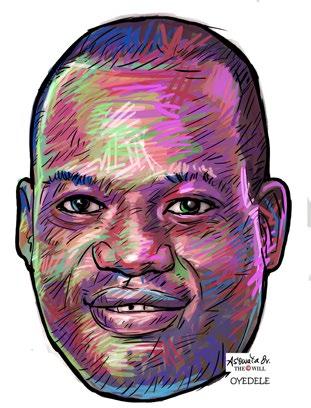
and the commitment as a people to solve that problem once and for all,” Oyedele declared at an interactive media session in Lagos on Saturday, October 3.
He used the opportunity to declare that there has been no new taxes introduced by the Bola Tinubu-led administration since it came into office in May 2023. Instead, the tax reform is aimed at harmonizing existing multiple tax frameworks and also relieving the tax burden on small businesses.
“The new tax laws offer major tax reliefs to small businesses. The new tax structure is designed to encourage formalisation by exempting small
companies with annual turnover of N100m or less from corporate income tax. In addition, these small businesses are exempted from charging VAT or accounting for withholding tax on their transactions.
The goal is to reduce the burden on nano, micro and small businesses who constitute the largest share of employment and GDP.
He added that there is an ongoing process to reduce over 60 different taxes and levies to fewer than 10, easing compliance and curbing proliferation of multiple charges. Contrary to the misconception about imposing a higher tax burden or introducing new taxes, the current administration is reducing both the number of taxes and the burden on citizens and businesses.
He noted that some taxes which were introduced by the previous administrations have in fact been reversed or suspended including the 5% levy on airtime and data, cybersecurity levy on bank transfers, carbon tax on single used plastics, excise tax on vehicles and so on.
“The new tax laws did not introduce taxes on individuals who were not previously taxable.
“Online content creators, influencers, income from virtual assets, and other income generating activities have always been subject to tax under the old Personal Income Tax Act.
“The new tax laws only provide clarity, and ensure fairness by allowing deductions for losses where applicable. Income earned by way of a gift rather than as a payment for a transaction is not taxable,” he said.

In Part One of this series, we explored how networks can either stall progress or scale reform, depending on how they are designed, governed, and mobilised. We looked at examples from across Africa: from Rwanda’s local innovations to Burkina Faso’s uprising, showing that reform is rarely a solo act. It is carried by coalitions, whispered by advisers, and distributed through relationships.
But how do you actually build a network that scales?
Let us begin with a simple truth: not every network is built to grow. Some are designed to protect power, not share it. Others, however, are constructed to adapt, expand, and connect ideas across borders, sectors, and generations. The distinction isn’t just structural, it’s relational and intentional.
COMPARING NETWORKS THAT STALL VS. THOSE THAT SCALE
At first glance, all networks may look similarmeetings, collaborations, partnerships. But dig a little deeper, and you will see clear patterns.
• Leadership in stalling networks is centralised and elite-dependent. In contrast, scaling networks operate on distributed trust, where power is shared across a web of contributors.
• Access is the ultimate litmus test: stalling networks gatekeep knowledge and influence; scaling networks open channels across sectors, regions, and classes.

• The Narrative matters too. One defends the status quo while the other articulates a bold, reformist vision.
• Adaptability is key. Networks that stall are rigid and protocol-bound. Those that scale are flexible and experimental.
• Relational Culture - The difference is profound; one is competitive and transactional while the other is cooperative and generative.
Understanding these differences is the first step. But what does it take to build a network that truly scales?
HOW TO BUILD NETWORKS THAT SCALE (ESPECIALLY IN AFRICA)
Here are five principles for building scalable networks, rooted in relational intelligence within our African context
1. Map Trust, Not Titles
Too often, reformers and development actors map power by position i.e. who holds the title, who chairs the meeting. But in many African contexts, influence flows through trust, not hierarchy.
Ask instead: Who are the bridge-builders? Who moves between class, generation, or sector with credibility? Who can pick up the phone and actually get people to show up?
These are the real nodes so it is important to build with them.
2. Anchor the Network in a Shared Pain or Hope
Scalable networks rarely form around abstract goals. They form around shared stakes - pain points that people want to solve, or hopes they are desperate to realise.
Whether it is ending police brutality, improving health access, or disrupting gatekeeping, the most resilient networks are bound by emotional resonance, not just strategic alignment.
Ask: What is the aspiration (or wound) that unites useven if temporarily?
3. Design for Movement, Not Just Meetings
Meetings are where good ideas often go to die, especially when consumed by formalities, status signaling, or endless steering committees. Scaling networks prioritise movement: fluid communication, rapid experimentation, and distributed decision-making. This includes chat groups, rotating leadership and small task forces with real autonomy. These keep energy high and action close to the ground.
Ask: Is this network producing motion or minutes?
4. Institutionalise Without Bureaucratising
As networks grow, some structure becomes necessary. But structure must serve momentum, not suffocate it. Create just enough: shared onboarding materials, rotating conveners, living documents, and clear channels for feedback. Resist the urge to replicate bureaucracy under the banner of coordination.
Ask: Are we building something sustainable or just slow?
5. Balance Visibility and Discretion
Not every contributor needs to be on stage. Some of the most effective actors in a scaling network are behind-the-scenes fixers, whisperers, or connectors who prefer privacy to platform.
The key is to keep them aligned with the mission, not with ego, access, or personal gain.
Ask: Does every voice have to be loud to be useful?
DESIGNING REFORM NETWORKS FOR IMPACT
In Africa, where formal institutions are often politicised, brittle, or slow to adapt, relational networks remain one of the most effective vehicles for meaningful change. But not all networks are built to move. Some are created to circle power, gatekeep influence, and simulate progress while leaving underlying systems untouched.
These are networks that maintain - closed loops that reinforce hierarchy, reward proximity to power, and measure success by access, not outcomes. They are cul-de-sacs, looping endlessly among the already connected. Reform ideas enter, but rarely exit with velocity.
But there are other networks. Networks that move. These are highways, not cul-de-sacs - designed for circulation, scale, and shared momentum. They distribute leadership, scale trust, and invite participation across class, geography, and sector. They evolve. They adapt. And they move people, policy, and
Let us begin with a simple truth: not every network is built to grow. Some are designed to protect power, not share it. Others, however, are constructed to adapt, expand, and connect ideas across borders, sectors, and generations
ideas forward.
NIGERIAN EXAMPLE: THE STARTUP ACT NETWORK
A favourite case in point is the 2022 Nigerian Startup Act. At first glance, this looked like a policy win. But beneath the legislative language was a relational engine. The network that moved the Act forward wasn't housed in a ministry or led by one senator. It was driven by a coalition of young tech founders, ecosystem builders, diaspora advisers, and policy insiders who bridged divides between innovation and government.
They used informal channels - WhatsApp groups, Twitter threads, Telegram communities, to coordinate and gather momentum. But they also designed formal infrastructure: town halls, legal drafts, cross-sector consultations. The network was decentralised but deliberate. It had movement logic, not just committee logic.
Most importantly, it propelled something - a shift in how the government views innovation, and how young Africans view policy engagement.
As we look ahead to pivotal moments - elections, constitutional debates, climate transitions, regional security shifts, the future will not belong to those who merely occupy positions, but to those who mobilise relationships.
It is easy to confuse access with influence, or meetings with momentum. But scalable change rarely travels through stagnant rooms.
So ask yourself:
“Is your network designed to protect somethinga job, a title, a gate?
Or is it built to propel something - an idea, a movement, a better future?”
The answer to that question may determine whether your idea stalls in a room, or scales across a region.
Because in this era, change doesn’t trickle down, it moves sideways, at the speed of trust.
Aramide Abe is a networking expert and a professional in international development. She is the convener of an African business leader network - Naija Startups. Follow arams on Twitter, Website - www.aramide.ng


BY
Nigeria’s fintech revolution has fundamentally transformed the banking landscape in Africa’s largest economy. Platforms like Flutterwave, Paystack, OPay, and Kuda now process billions of naira daily, creating unprecedented access to financial services for millions previously excluded from traditional banking. The Central Bank of Nigeria reports that mobile money transactions exceeded N59 trillion in 2023, positioning Nigeria as Africa’s largest and most dynamic fintech market.
This digital transformation represents a significant leap forward in financial inclusion, allowing Nigerians to send money, pay bills, save, invest, and access credit through their smartphones. However, this rapid digitisation has created a parallel challenge: as millions of digital wallets emerge, they’ve become prime targets for increasingly sophisticated cybercriminals. The very technology that has democratised financial access now presents new vulnerabilities that both users and providers must urgently address to protect Nigeria’s digital financial future.

Nigeria’s fintech sector has experienced unprecedented growth, driven by high smartphone penetration and a young population that is tech-savvy. Digital banking platforms like Kuda, Carbon, and PalmPay have onboarded millions of users, while payment processors cater to everything from street vendors’ transactions to large corporates’ payments. From Lagos merchants accepting QR code payments to remote workers receiving international transfers, fintech has democratised financial services across the country.
Nigerian fintech users face several significant threats. One is SIM swap fraud, where attackers convince telecom operators to reassign phone numbers to new SIM cards, gaining access to two-factor authentication messages and potentially taking over accounts. Phishing attacks also pose a risk, as scammers create sophisticated fake websites and messages targeting Nigerian fintech users, tricking victims into revealing logins, OTPs, or sensitive data.
Vishing is another threat, with criminals posing as bank officials during phone calls to extract sensitive information. Additionally, fake fintech apps mimic legitimate services to capture user credentials and financial information, potentially recording logins and intercepting SMS codes. Credential stuffing is a further concern, where attackers use passwords stolen

from data breaches to attempt access to fintech platforms, exploiting users who reuse passwords across services.
The most effective defences include stronger authentication methods, such as using authenticator apps like Google Authenticator instead of SMS verification, and enabling biometric options like fingerprint and facial recognition. Mobile device security is crucial— users should implement strong screen locks, avoid public Wi-Fi for financial transactions, install reputable security software, and keep devices updated.
Account monitoring through real-time alerts for all transactions and login attempts, along with regularly reviewing transaction history, helps detect suspicious activity early. Password management is vital; using unique, strong passwords for each fintech account, preferably generated and stored with a password manager, while avoiding personal information and changing passwords regularly, enhances security.
Users should be alert to warning signs, including the fact that legitimate fintech companies never request passwords, PINs, or OTPs through unsolicited communications. It is wise to be suspicious of urgent verification requests, unexpected security alerts, or offers that seem too good to be true. Unexpected SIM deactivation or sudden network loss may indicate a SIM swap attack in progress.
Developing a security-first mindset involves diversifying financial activities across multiple
platforms to limit potential losses and keeping backup funds in traditional banking accounts. Avoiding storing large amounts in digital wallets unnecessarily, performing regular security maintenance such as quarterly password updates, and educating family members and employees who access shared devices or accounts all contribute to long-term security.
Nigeria’s fintech boom represents a pivotal moment in the country’s economic development, offering unprecedented opportunities for financial inclusion, economic growth, and technological advancement. However, the sustainability of this digital financial ecosystem hinges on establishing a robust security culture among both users and providers.
As Nigeria continues to lead Africa’s fintech revolution, the challenge lies not merely in expanding services but in building an infrastructure of trust. Financial institutions must invest in cutting-edge security systems and user education, while consumers must adopt proactive security practices as second nature. Government regulators also play a crucial role in establishing and enforcing security standards that protect users without stifling innovation.
The future of Nigeria’s fintech sector will be determined not just by the convenience and accessibility of its services but by its resilience against evolving cyber threats. By collectively prioritising security alongside innovation, Nigeria can ensure its digital finance ecosystem remains a powerful engine for economic empowerment rather than a vulnerable target for cybercriminals. The promise of financial inclusion through technology can only be fully realised when digital wallets are both accessible and secure for all Nigerians.
•Makinde is an IT professional
Account monitoring through real-time alerts for all transactions and login attempts, along with regularly reviewing transaction history, helps detect suspicious activity early


BY OGOCHUKWU ONWAEZE
As the Federal Government moves ahead with plans to impose a 30% Capital Gains Tax (CGT) on the disposal of shares and other capital assets, market analysts and industry leaders warn that the reform could have unintended consequences for investor confidence and Nigeria’s standing among African investment destinations.
Foreign portfolio investors have already begun pulling out of Nigerian equities as a result of the development. Outflows in January 2025 alone stood at N45.8 billion, significantly outpacing foreign inflows of N25.66 billion. This comes amid growing concerns over tax unpredictability and policy risks.
“The new capital gains tax could make Nigeria one of the least attractive equity markets in Africa,” warned an industry expert in a recent market commentary, noting that countries like Kenya offer 0% CGT on listed securities, while Ghana maintains a lower rate of about 15%.
While the Federal Government — through its Presidential Fiscal Policy and Tax Reforms Committee, led by Taiwo Oyedele — has defended the proposed tax as a move towards fairness and fiscal sustainability, critics argue that the measure could inadvertently deter long-term investment.
Nigeria has long struggled to attract sustained foreign capital inflows due to currency instability, regulatory risk, and now — unfriendly tax policies. This is considered a drawback on the economic gains being brandished by the government as a major achievement since the change of administration in May 2023.
The Chief Executive of 11PLC, Otunba Adetunji Oyebanji, warned in September that the hike in CGT “may discourage high capital projects and foreign investment.” His statement mirrors the growing anxiety among domestic corporates that capital-raising efforts could suffer as investors factor in the higher cost of exit.
Nigeria’s regional peers offer a more taxfriendly environment:
Kenya exempts listed securities from CGT, encouraging higher stock turnover and foreign participation.
Ghana levies around 15% CGT, while South Africa operates a tiered system generally seen as more predictable.
In contrast, Nigeria’s proposal to impose a flat
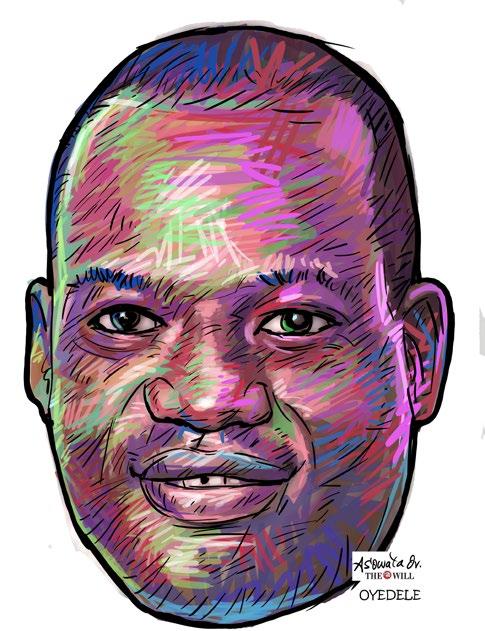
30% CGT on gains exceeding N100 million — even if reduced to 25% after negotiations — may widen the competitiveness gap.
Foreign investor participation on the Nigerian Exchange has fallen below 15%, down from highs of over 50% a decade ago. While some of this reflects broader macroeconomic challenges, market watchers say the CGT proposal is compounding the retreat.
The NGX itself has hosted several stakeholder engagements urging the government to reconsider the tax structure, especially its implications for listed equities. Sources within the exchange say investor sentiment surveys conducted recently show “heightened concerns” over the lack of clarity on issues such as:
-The calculation of historical cost basis
-Whether losses can be carried forward
-How gains from reinvestments will be treated
In public statements, Taiwo Oyedele, chair of the tax reform committee, has defended the proposal, arguing that higher exemption thresholds, streamlined tax codes, and a phased implementation plan will minimize disruption.
He also noted that Nigeria’s overall tax-to-GDP
ratio remains among the lowest globally, and that the reforms aim to shift the tax burden towards wealth and investment income rather than consumption or small businesses.
“We are not targeting genuine investors. We are targeting rent-seeking, short-term speculative gains that have previously gone untaxed,” Oyedele said during a stakeholder dialogue in Abuja September.
With mounting pressure from capital market operators, business groups, and foreign investor networks, the Federal Government may be forced to revisit the CGT threshold or provide transition relief to ease implementation.
Industry experts insist that Nigeria now stands at a crossroads: it must balance its urgent need to raise non-oil revenues with the imperative of maintaining a competitive investment climate.
Commenting on the overall tax reform, the Presidential Fiscal Policy and Tax Reforms Committee on Friday, October 3, engaged journalists, influencers, and public analysts in an interactive session in Lagos to clarify some misconceptions surrounding Nigeria’s newly enacted tax reform laws.
Speaking at the session, Oyedele, stated that while it is not unusual for tax reforms to be misunderstood anywhere in the world, deliberate misreporting and uninformed analyses are harmful to our collective interest given that the reforms are designed to benefit ordinary Nigerians, secure long-term economic stability and inclusive growth for the country.
“The objectives of the reforms have been clear from the very beginning – reduce the tax burden on the masses, harmonise and simplify tax rules to address multiplicity of taxes, promote a modern, business friendly and globally competitive tax system. Our approach is people-centric, growth-focused, and efficiency-driven,” Mr. Oyedele said.
With mounting pressure from capital market operators, business groups, and foreign investor networks, the Federal Government may be forced to revisit the CGT threshold or provide transition relief to ease implementation





Photo Editor: Peace Udugba [08033050729]

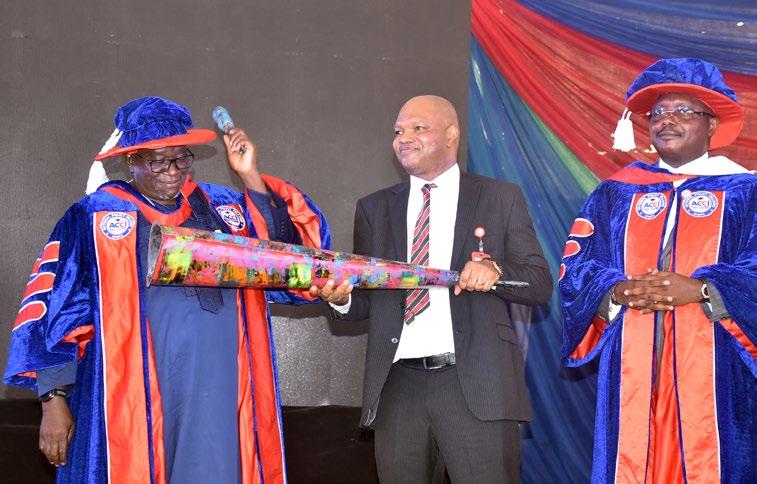
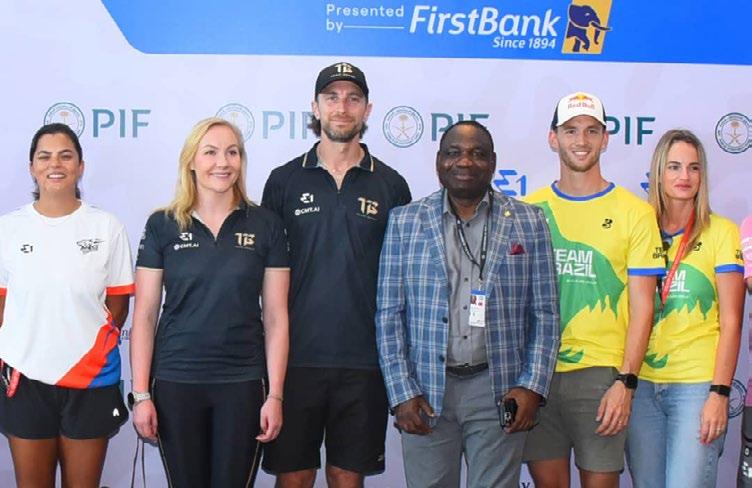




BY JUDE OBAFEMI
Nigeria's Flying Eagles find themselves perched on the edge of the knockout stage at the FIFA Under-20 World Cup in Chile, their fate balanced on a knife's edge after two contrasting performances. The team has accumulated three crucial points from a frustrating 1-0 defeat to Norway followed by a dramatic 3-2 victory over Saudi Arabia that came alive in the dying moments. Those results position the side third in Group F behind Colombia and Norway, both sitting comfortably on four points.
A draw against Colombia on Sunday at midnight Nigerian time will confirm their passage to the round of 16, but the path has been anything but straightforward. The group has proved genuinely tough, with each match exposing both the considerable strengths and persistent errors in the Nigerian setup. This campaign offers a valuable chance to build on past African successes while addressing familiar issues in clinical finishing and defensive organisation.
Group F features four contrasting football nations: Colombia, Nigeria, Norway, and Saudi Arabia. Colombia opened their campaign with a narrow 1-0 win over Saudi Arabia, then ground out a hard-fought 0-0 draw with Norway. Norway took one point from that stalemate and maximum points from their victory over Nigeria. Saudi Arabia sit bottom with zero points after two
The tournament runs until October 19, so a strong finish
dispiriting losses. The standings after two matchdays paint a clear picture: Colombia lead with four points and goal difference plus one; Norway follow on four points with identical goal difference; Nigeria hold three points with goal difference zero; Saudi Arabia have zero points with goal difference minus three.
Nigeria's precarious position means the final group game against Colombia carries enormous significance. The South American side need only a point to secure top spot, but Nigeria can leapfrog them with a victory. A draw may technically suffice but will depend on other third-placed teams from other groups not amassing enough points to qualify ahead of the four points Nigeria will have earned. Beyond the group stage, the draw could pit Nigeria against the runner-up from Group E, which includes France, the United States, South Africa, and New Caledonia. The tournament runs until October 19, so a strong finish opens multiple paths to deeper runs, perhaps even the semi-finals if the team sharpens its attacking edge.
The tournament opener against Norway on September 29 delivered a harsh lesson in European efficiency. Played at Estadio Fiscal in Talca, the match ended 1-0 to the Europeans in a result that left Nigerian players frustrated. Norway scored from a penalty in the ninth minute after a handball in the area by U-20 captain Daniel Bameyi. The spot-kick was coolly converted by player-of-the match Rasmus Holten. Nigeria pushed relentlessly for an equaliser but lacked crucial precision in the final third. Norway defended deep in a well-organised 4-2-3-1 formation that absorbed pressure and countered intelligently.
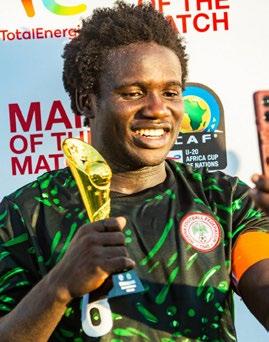
Nigeria lined up in an attacking 4-3-3 under coach Aliyu Zubairu, aiming to exploit width through pacey wingers Orseer Achihi and Tahir Maigana. The midfield trio of Nasiru Salihu, Daniel Daga, and Israel Ayuma controlled tempo but struggled to break defensive lines. Norway's disciplined press disrupted passing, leading to just 65 per cent accuracy in Nigeria's final third. Goalkeeper Ebenezer Harcourt made three important recoveries but could do nothing about the penalty. Bameyi won six aerial headers but lost possession twice in dangerous areas. Forward Kparobo Arierhi created chances, including a curling effort that hit the post in the 71st minute.
Three days later, Nigeria faced Saudi Arabia in another Talca fixture on October 2. The result dramatically flipped the script: a pulsating 3-2 triumph that kept hopes alive. Nigeria struck first in the 10th minute through Salihu Nasiru, who latched onto a through-ball from Sani Suleiman and slotted past goalkeeper Hamed Al-Shanqiti. Saudi Arabia leveled in the 21st minute when Amar Al-Yuhaybi hit a right-footed shot from the centre of the goal, beating Harcourt at the near post. Nigeria responded before half-time, with defender Amos Ochoche finding the net from inside the opposition box with first goalscorer Nasiru turning provider in the 38th minute.
The score stood at 2-1 at the interval ahead of the goals the second half brought. Saudi Arabia equalised in the 51st minute through second-half substitute Talal Haji, who finished clinically on a counter after a Nigerian turnover. The game looked set for a draw and another significant drop of points by the Nigerian team before it all turned around in stoppage time. In the 94th minute, Bameyi converted a crucial penalty after a handball by left back Award Aman inside the box. The kick, struck low to the keeper's right, sparked wild celebrations. Zubairu introduced more direct play after the Norway critique. Salihu earned man of the match with his goal and two key passes. Bameyi's composure under pressure defined his captaincy. Weaknesses lingered: both concessions came from defensive lapses, echoing the Norway goal.
Colombia present the sternest test yet. The match kicks off at 8pm local time on October 5, midnight in Nigeria, at Estadio Fiscal. Colombia top the group after a 1-0 win over Saudi Arabia via an Oscar Perea goal and the stalemate with Norway. They deploy a compact 4-3-3, strong in midfield with players like Jordan Barrera dictating tempo. Nigeria must target their fullbacks with pace while avoiding dangerous counters. A draw yields four points, matching Colombia. Victory guarantees first place and an easier knockout path. Defeat means elimination.
This tournament carries profound weight for Nigerian football. Success could fast-track talents to European clubs, much like John Obi Mikel or Odion Ighalo. The Flying Eagles stand at a crossroads. The Norway defeat exposed flaws; the Saudi win proved adaptability. Against Colombia, execution will decide if Nigeria extend their stay or exit early. The side possesses pace, physicality, and growing unity. The final whistle on Monday will tell if Nigeria can mount a memorable run or reflect on missed chances. Again.
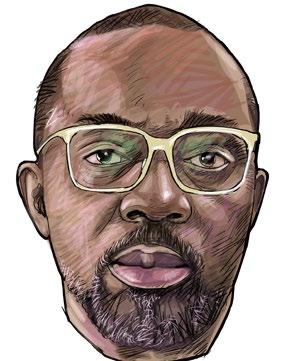
With Professor Mahmood Yakubu due to leave office in November 2025, the choice of his successor will be a decisive signal about how the Bola Tinubu Administration intends to manage the electoral cycle that leads to the 2027 General Election. The appointment is not merely a personnel matter because the chair of the Independent National Electoral Commission sets the tone and direction for how the country will register voters, run polling and handle disputes in the years ahead. The constitutional process gives the President the power to nominate the chair, subject to confirmation by the Senate and requires consultation with the Council of State before finalisation.
The European Union Election Observation Mission produced a detailed final report on the 2023 election and issued a list of reforms that it said were needed to strengthen credibility. The mission gave a set of recommendations directed at INEC, the legislature and other institutions and made clear that gaps in practice and law had contributed to public doubts about the conduct of the 2023 vote. Those recommendations remain a reference point for any serious discussion on who should lead the electoral commission and how the next poll will be organised.
Public confidence in the electoral system is thin and voter participation fell sharply in 2023. Independent reporting of official returns put turnout for the presidential and national assembly polls at roughly 26.7 per cent of registered voters, a marked decline from 2019. Surveys conducted before and after the vote documented that large numbers of citizens did not trust the electoral commission to act without political partiality. This mix of low participation and low trust raises a clear risk: Appointment choices that look partisan or opaque are likely to deepen scepticism and reduce incentives to vote.
The calendar for reforms and legislative work that would address these problems is tight. INEC has publicly told the National Assembly that early passage of amendments to the electoral legal framework is essential for proper planning. Parliamentary committees have produced draft amendment bills and the leadership of the legislature has signalled a renewed push to move measures through their stages, but the work requires detailed hearings and votes on contested provisions. The reality is that a delay in settling the legal framework will complicate operational planning and provide an opening for critics to doubt the neutrality of the administration and of the commission it appoints.
Civil society groups and some legal campaigners have asked for a transparent, documented selection process that includes For

published criteria and a clear timetable. The Socio-Economic Rights and Accountability Project urged the presidency to disclose details of the selection process and public interest organisations have sought ways to monitor the procedure without violating vetting rules. That demand reflects wider unease about political influence in appointments that affect national institutions. The Senate confirmation stage offers a formal check, but it is a test only if the public and credible watchdogs can see how candidates were chosen and what standards will guide the confirmation hearing.
There are practical steps and early signals that will matter. The publication of the criteria that the presidency used to assess candidates would give citizens and the press a clear metric against which to judge nominees. Release of scheduled timelines for security vetting and Council of State consultations would reduce room for secret manoeuvring. Journalists and advocacy groups have already asked whether the list of candidates and the process papers will be shared and whether Senate committee records from the confirmation will be made public.
There is limited time to bring legal and administrative changes into effect if they are to have a meaningful impact on
it would

the next cycle. That external pressure increases the political stakes of the appointment and creates stronger public expectations for openness.
It is being speculated that President Bola Tinubu is likely to nominate Kogi State born Joash Ojo Amupitan, SAN, a university scholar, lecturer and Deputy Vice Chancellor at the University of Jos, Plateau State. I have not been able to independently confirm the names of the other frontline contenders yet.
For the credibility of the election process, it would do us a great good if the president publishes the selection criteria adopted for choosing the next INEC chairman. Making the formal shortlist public for debate and scrutiny before a Council of State debate and Senate confirmation will show that merit and neutral experience are the guiding forces. These are the types of steps that observers, including myself and many civil society organisations, have been pressing for in public statements and briefings.
There is also a practical political dimension. If the nomination and confirmation take place in public view and the candidate has a record of non-partisan administrative competence, the appointment could help stabilise the road to 2027 by giving voters some assurance that elections will be managed professionally. If the process looks rushed, secretive or beholden to partisan considerations, then the opposite is likely. Political actors who are not satisfied with an appointment produced by opaque methods will have incentives to contest results and those disputes will occur in a context of already thin turnout and fragile trust.
Independent observers warned after 2023 that unresolved problems in law and practice make this scenario more likely unless tangible steps are taken.
The appointment of the next INEC chair will shape public expectations and practical preparations for 2027. It may be the last major institutional choice before national campaigns intensify. Given the EU recommendations, the low turnout and the active legislative agenda, a transparent and credible appointment process, is a basic condition for rebuilding trust in the electoral system. If the presidency, the legislature and INEC respond to that test with clear public records and measurable steps, the country will make a modest but important step towards restoring confidence in our democracy. If they do not, the appointment will be a further source of doubt at a time when public trust is already fragile, if not already lost.